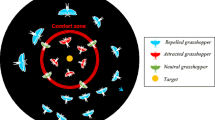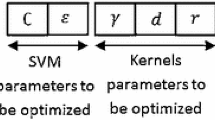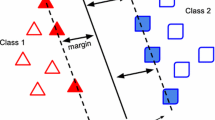Abstract
Choosing optimal parameters for support vector regression (SVR) is an important step in SVR design, which strongly affects the performance of SVR. In this paper, based on the analysis of influence of SVR parameters on generalization error, a new approach with two steps is proposed for selecting SVR parameters. First the kernel function and SVM parameters are optimized roughly through genetic algorithm, then the kernel parameter is finely adjusted by local linear search. This approach has been successfully applied to the prediction model of the sulfur content in hot metal. The experiment results show that the proposed approach can yield better generalization performance of SVR than other methods.
Similar content being viewed by others
References
V. Vapnik. The Nature of Statistical Learning Theory [M]. New York: Springer, 1995.
V. Vapnik. An overview of statistical learning theory [J]. IEEE Trans. on Neural Networks, 1999,10(5):988–999.
B. Samanta, K. R. Al-Balushi, S. A. Al-Araimi. Artificial neural networks and support vector machines with genetic algorithm for bearing fault detection [J]. Engineering Applications of Artificial Intelligence, 2003, 16(7,8):657–665.
V. Cherkassky, Y. Ma. Practical selection of SVM parameters and noise estimation for SVM regression [J]. Neural Networks, 2004,17(1):113–126.
G. W. Flake, S. Lawrence. Efficient SVM regression training with SMO [J]. Machine Learning, 2002,46(1–3):271–290.
P. Laskov. An improved decomposition algorithm for regression support-vector machines [J]. Machine Learning, 2002,46(1–3):315–350.
Wenjian Wang, Zongben Xua, Weizhen LUC, et al. Determination of the spread parameter in the Gaussian kernel for classification and regression [J]. Neurocomputing, 2003,55(3,4):643–663.
C. R. Houk, J. Joines, M. Kay. A genetic algorithm for function optimization: a matlab implementation [R]. North Carolina State University, Report No. : NCSU IE TR 95 09,1995.
Z. Michalewicz. Genetic Algorithms + Data Structures = Evolution Programs [M]. 3rd ed. New York: Springer, USA, 1999.
Hang Bao, et al. Artificial intelligent application in metallurgy process [C]// Proc. of Int. Conf. MSMM. Beijing: Metallurgical Press, 1996: 440–442.
B. Qin, X. Wang, M. Wu. Expert system for predicting the silicon content in hot metal based on RBF neural network [J]. Electric Drive, 2002,32(3):25–27.
V.R. Radhakrishnan, A.R. Mohamed. Neural networks for the identification and control of blast furnace hot metal quality [J]. J. of Process Control, 2000,10(6):509–524.
K. M. Chung, W. C. Kao, T. Sun, et al. Decomposition methods for linear support vector machines [R]. Department of Computer Science and Information Engineering, National Taiwan University, 2002.
Author information
Authors and Affiliations
Additional information
This work was supported by the National Natural Science Foundation of China (No. 60574030), the National Basic Research program of China (No. 2002CB312203) and Foundation of Educational Department of Hunan Province (No.05C523) .
Xin WANG received her M.Eng. in Computer Technology and its Application from Central South Forestry University. Currently, she is a Ph. D. candidate in the School of Information Science & Engineering, Central South University. Her research area centers on artificial intelligence methods such as support vector machines, neural networks, and multi-objective optimization. E-mail: wwangxin97@163.com.
Chunhua YANG received her M.Eng. in Automatic Control Engineering and her Ph. D. in Control Science and Engineering from Central South University, China in 1988 and 2002 respectively, and was with the Electrical Engineering Department, Katholieke Universiteit Leuven, Belgium from 1999 to 2001. She is currently a full professor in the School of Information Science & Engineering, Central South University. Her research interests include modeling and optimal control of complex industrial process, intelligent control system, and fault-tolerant computing of real-time systems.
Bin QIN received his M. Eng. in Automatic Control Engineering from Central South University in 1988. Currently, he is a full professor in the Electrical Engineering Department of ZhuZhou Institute of Technology. His research interests include the modeling and intelligent control of complex industries process, application of multi-agent system, and evolutionary algorithms.
Weihua GUI received the the B.Eng. degree (Control Science and Engineering) and the M.Eng. degree (Control Science and Engineering) from Central South University, Changsha, China in 1976 and 1981, respectively. From 1986 to 1988 he was a visiting scholar at Universitat-GH-Duisburg, Germany. He has been a full professor in the School of Information Science & Engineering, Central South University, Changsha, China, since 1991. His main research interests are in modeling and optimal control of complex industrial process, distributed robust control, and fault diagnoses.
Rights and permissions
About this article
Cite this article
Wang, X., Yang, C., Qin, B. et al. Parameter selection of support vector regression based on hybrid optimization algorithm and its application. J. Control Theory Appl. 3, 371–376 (2005). https://doi.org/10.1007/s11768-005-0026-1
Received:
Revised:
Issue Date:
DOI: https://doi.org/10.1007/s11768-005-0026-1




